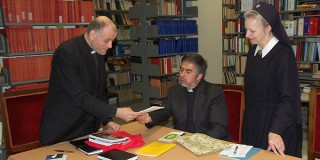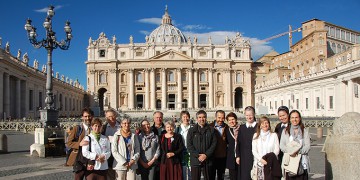The key to a Christian personality is education and formation
 These days, the Church cannot count on Christian States or on environments through which, one can secure the formation of Christian personalities. Said Father Friedrich Bechina, sub secretary for the Congregation for the Catholic Education, on October 24th 2014 in a meeting with representatives of pedagogic projects and initiatives from the International Schoenstatt Movement. “The key to a Christian personality is education and formation“ and he thanked the Schoenstatt Movement, in the name of the Congregation for the Education, “for the wonderful work that you make in different countries in such a varied and diverse way. … With this, you make something really good, not only for the Church, but also for society, that finds itself in front of huge challenges.”
These days, the Church cannot count on Christian States or on environments through which, one can secure the formation of Christian personalities. Said Father Friedrich Bechina, sub secretary for the Congregation for the Catholic Education, on October 24th 2014 in a meeting with representatives of pedagogic projects and initiatives from the International Schoenstatt Movement. “The key to a Christian personality is education and formation“ and he thanked the Schoenstatt Movement, in the name of the Congregation for the Education, “for the wonderful work that you make in different countries in such a varied and diverse way. … With this, you make something really good, not only for the Church, but also for society, that finds itself in front of huge challenges.”
Education and formation for “God’s workers”
To conclude their jubilee pilgrimage, the Schoenstatt Movement traveled to Rome to give the Church its 100 years of history and experiences and, in that way, to be present in the heart of it, said the Chilean, Father Raúl Espina, at the beginning of the encounter. The 15 members that accompanied him were present because they felt motivated by different kind of projects and initiatives in every possible area of pedagogy. One could look at these projects in the Covenant culture tent “Pedagogy” in the first half of this international pilgrimage in Schoenstatt, Vallendar, place of origin of the Schoenstatt Movement. “At the beginning of Schoenstatt, Father Kentenich wanted the youth with whom he worked, to understand that they were God’s personalities and workers, with a grate mission. This missionary dimension, to know oneself God’s worker, is a fundamental desire of our spirituality and our pedagogy”, said Father Raúl. Schoenstatt is, above all, about freedom, about community and formation of the world. This is why in all this topics we have developed different pedagogic initiatives, for example, about formation of character and personal individuality, above all in youth pedagogy, but also in fields like schools and universities, adults formation, economics and business administration and, of course, in the great field of social pedagogy.
Main goal: international joined work
 Sister Daniela Rodríguez, Alejandra Grebe and Alejandra García-Huidobro from Santiago, Chile, talked about the school projects around the world, emphasizing the initiative about a network of Schoenstatt Schools. As is being talked in European politic circles about the future of political formation, it is also being talked, more and more, about a joined work in teachers’ formation. At a university level this work is already being done. “For us, it would be wonderful to be able to give an example of catholic schools and teachers.” It is about students exchange and, more important, about being able “to gather teachers’ experiences in other cultural context.” This is also related to the so called “Service-Learning”, that is, learning experiences out side their own country, which are often linked to social projects. “For this, we need places in different countries, but when we already have schools it can work really well.”
Sister Daniela Rodríguez, Alejandra Grebe and Alejandra García-Huidobro from Santiago, Chile, talked about the school projects around the world, emphasizing the initiative about a network of Schoenstatt Schools. As is being talked in European politic circles about the future of political formation, it is also being talked, more and more, about a joined work in teachers’ formation. At a university level this work is already being done. “For us, it would be wonderful to be able to give an example of catholic schools and teachers.” It is about students exchange and, more important, about being able “to gather teachers’ experiences in other cultural context.” This is also related to the so called “Service-Learning”, that is, learning experiences out side their own country, which are often linked to social projects. “For this, we need places in different countries, but when we already have schools it can work really well.”
Kentenich pedagogy in every day life
The presentation of the INVENIO University, whose founder, Adrián Lachner from Costa Rica was also present, was of great interest. The dual studies of business administration consist in technical and human sciences subjects and economics. The university applies the Kentenich pedagogy and with it promotes the responsibility for oneself and the personal development of the students and in this way, in an organic union, unites the academic knowledge with the development of free and strong personalities.
Representatives of Hungary and Germany presented other projects and initiatives about adult formation, as the “Little Kentenich University”, the Academy for family pedagogy, the International Academy for businessmen and the “Kentenich Quiz”. All these projects have in common that they answer concrete life questions for the growing of the own personality from a Schoenstatt spirituality, but also for the relation with kids, the life partner or the coworkers.
Invitation to work together
“What you do, applies very well to the development of the Church today”, said Father Bechina at the end of the meeting. “I hope this encounter becomes the beginning of a joined work.” The Congregation has planed a big congress with about 2000 people for 2015. Here they want to improve the linked work and create more exchange possibilities. In this context he indicated the Instrumentum laboris of this meeting, which will be presented with the title “Education today and tomorrow – an always new passion” and he invited the Schoenstatt delegation to participate.
“It was a really good encounter”, said the participants after the meeting. “It wasn’t only about informing the Curia, we benefit from it as well. It always amazes us how little we know about each other.” “We went to this meeting together but we hadn’t met before that. For me it was really a family experience. We are Father Kentenich’s family.”
